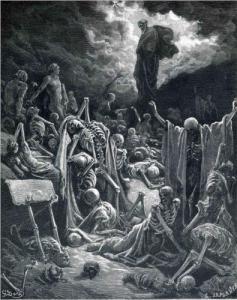
One of the scariest passages in the Bible is Ezekiel 33.7-9.I first read this before I was a teenager and it scared me deeply.In case you don’t feel like clicking over to BibleGateway and searching, the pericope is a section where Yahweh is warning Ezekiel about the dangers of giving up hope (in the larger context).Ezekiel, you see, had lived through the fall of Jerusalem.Many people of Judah felt that the destruction of the temple was the end of the relationship between Yahweh and the chosen people.Ezekiel here is being warned to deliver good news.If Ezekiel doesn’t call out the lie (the sins of Israel weigh it down) he will be punished as if he were the sinner himself.I knew evangelical friends in college who lifted that verse out of context and said God would punish them if they didn’t warn the people.They weren’t so worried about the fall of Jerusalem—that was old news by the 1980s—but about some other issue they deemed important at the moment.
Taking verses out of context has a name.It’s called “prooftexting.”It can be done to just about any piece of writing, including this blog post.All it requires is finding a passage that says what you want it to and claim that it means what you say it does.The Bible’s a big, big book.Trying to understand its contents in context takes years of dedicated work.Even then biblical scholars don’t have all the answers because if they did we could all stay home and surf the net for the rest of our lives.No, engaging with sacred texts is a never-ending task, by definition.That warning to Ezekiel was for Ezekiel.What was that message?Stop saying the exile is the end!There’s more to the story.Read the book to the end and see.
The problem with prooftexting, if I might engage in a bit of it myself, is that it takes away from the totality of the Good Book itself.Not adding too or taking away from the Bible is a biblical command (taken out of context), which means that with the Bible it’s all or nothing at all.And if it’s the former, it means Ezekiel’s condemnation is contingent upon what follows.Back in biblical times there wasn’t as much reading material as there is today.It turns out, however, that there’s a lot more written down than we used to assume.If we’re going to read it we should do so within its context.But just in case, please be assured that the exile isn’t the end of the story.
